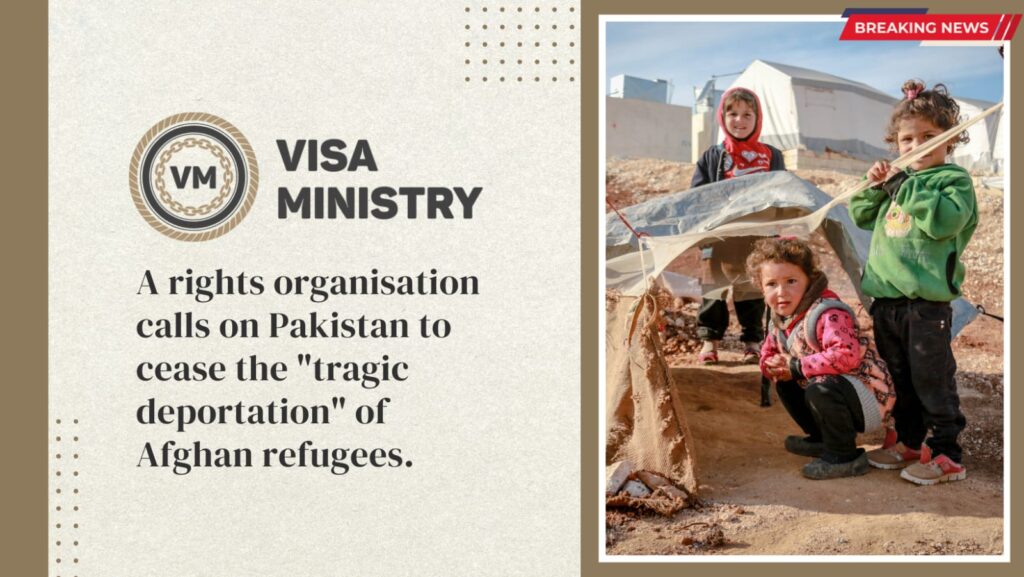According to Khaama Press, the Afghanistan Independent Human Rights Commission (AIHRC) pleaded with Pakistan on Sunday to halt the “tragic deportation” of Afghan refugees.
It said that the forcible expulsion of Afghan refugees from Pakistan is disastrous and endangers the lives of numerous people.
A number of human rights activists, protesting women, prosecutors, former government military personnel, and media activists are reportedly among the deported refugees, according to AIHRC.
According to Khaama Press, Pakistani officials have been detaining and arresting hundreds of Afghan migrants from Islamabad, Rawalpindi, and other Pakistani cities during the past week.
An Afghan news organisation called Khaama Press was founded in 2010.
The AIHRC requested the Pakistani government to stop arresting, harassing, and extraditing Afghan migrants after the deportation of hundreds of Afghan refugees, who have been the main victims of Afghanistan’s political instability, conflict, and regime change.
In order to stop the oppression of Afghan refugees, the AIHRC urged the UN High Commissioner for Refugees to have meaningful discussions with important Pakistani government agencies.
According to AIHRC, Pakistan’s Human Rights Commission, the Special Rapporteur on Human Rights in Afghanistan, and other significant regional and international bodies should look into the human rights situation of Afghan refugees in Pakistan.
Hundreds of Afghans fled to Pakistan after the Taliban made a comeback in August 2021 out of fear of Taliban persecution and death threats. Khaama Press said that human rights organisations and refugee advocacy groups are extremely concerned about the imprisonment and forced return of Afghan refugees.
According to the Taliban-run Ministry of Refugees and Repatriation (MoRR), more than 2,000 Afghan refugees have returned to their homeland from Iran, according to Afghan news outlet Khaama Press.
According to the Taliban-run Ministry of migrants and Repatriation (MoRR), at least 534 Afghan migrants entered Afghanistan through Islam Qala in Western Herat province. In addition, it stated that at least 288 of the 2000 returnees had been connected with the International Office for Migration (IOM) in order to obtain the most fundamental assistance.
According to Khaama Press, there are many reasons why the number of Afghan refugees returning to Afghanistan from Iran has risen in recent months at a never-before-seen rate.
According to a Khaama Press story, the head of the Taliban’s refugee department for Nimruz Mawlavi Abdullah Reyaz had claimed that around 65,000 refugees had returned to Afghanistan via the Pul-e-Abresham crossing site in the previous month.
In the meantime, the Ministry of Refugees and Repatriation, which is run by the Taliban, reported that more than 527,000 Afghan refugees had returned to their country in 2022.
It went on to say that Afghans either voluntarily fled Iran or were forced to. The UNHCR asserted that the persistent repatriation of Afghan refugees from nearby countries is directly tied to the escalating prices and a lack of employment opportunities in the host countries.
The Taliban-run Ministry of Refugees and Repatriation stated earlier on May 5 that as many as 2,106 Afghan refugees had returned to Afghanistan from Iran via the Islam Qala border in western Herat province.
The Refugee and Repatriation Ministry stated in a series of tweets that these migrants arrived back in Afghanistan on June 3, according to Khaama Press. At least 193 returnees were transferred to the International Office for Migration (IOM) for basic assistance, according to Taliban officials.
Source- the print

